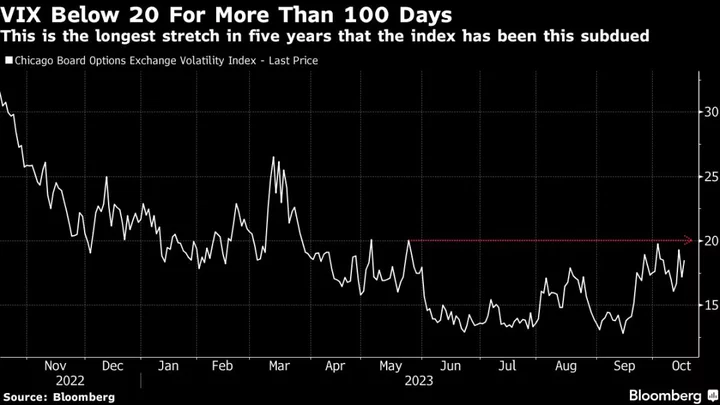Even as the conflict in the Middle East threatens to escalate, Wall Street traders remain squarely focused on ever-soaring Treasury yields and corporate America’s profit trajectory — with limited appetite to pay up for hedges.
While the darkening geopolitical climate poses challenges for everything from the supply of oil to appetite for risky assets, the Cboe Volatility Index – known as a fear gauge – has yet to close above the widely watched level of 20 during the crisis and is on track for its longest lull in five years. Meanwhile, the haven rally in Treasuries has evaporated with the 10-year note hitting 2023 highs. The S&P 500 is up a little more than 1% and Brent crude has risen about 6.5% since Oct. 6, the Friday before Hamas launched its attack on Israel.
“Investors prefer to stay on the sidelines and wait to see how things are unfolding instead of overreacting,” said Benjamin Melman, global chief investment officer at Edmond de Rothschild Asset Management. “It might be a sign of wisdom. But it suggests we have to be ready to see strong moves when a direction will get clearer.”
Read more: Wider War in Middle East Could Tip World Economy Into Recession
Here’s a look at how investors see conflict in the Middle East affecting other markets:
Oil
As long as oil stays under $100 a barrel, the impact on other markets will be limited, according to Manish Kabra, the head of US equity strategy at Societe Generale SA. Still, geopolitical concerns remain a “tail risk,” he said.
Stocks
With a raft of companies about to report third-quarter earnings and the US economy still signaling that inflation remains stubborn, many stock investors say the Middle East is relatively small factor in their decision making.
“The market has started to focus on the micro with the upcoming reporting season,” said Alberto Tocchio, portfolio manager at Kairos Partners. “I ultimately think that gold and oil are the best hedges along with buying cheap protection on indexes and both the energy and defense sectors should continue to outperform.”
Bonds
So far, primary bond issuance in Europe has been tilted toward safer assets with public sector borrowers also out in force. Financial issuers were also focused on the lower-risk debt they can sell, covered bonds in both euros and sterling.
To Guillermo Santos, head of strategy at Spanish private banking firm iCapital, the attractive trade right now is buying fixed income, especially with US yields near 5% and more conflict brewing in the Middle East.
There’s no discounting the catastrophic effects that may occur as a result of the ongoing war and while investors seem to be choosing to view this as an unfortunate but contained event, some corners of the market will definitely see stress, according to Luke Hickmore, an investment director at Abrdn Investment Management.
“It might seem calmer now, but if the war widens to include other parts of the area, then that means more pressure on oil and more uncertainty for the market to cope with,” he added. “If VIX pops close to 30, it is a sign of increasing nervousness and will put equity and credit under pressure.”
--With assistance from Farah Elbahrawy, Jan-Patrick Barnert, Anchalee Worrachate, Yongchang Chin, Sagarika Jaisinghani, Chiara Remondini, Alice Gledhill and Macarena Muñoz.

